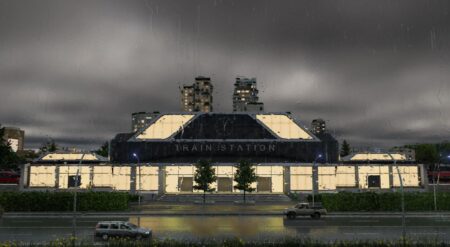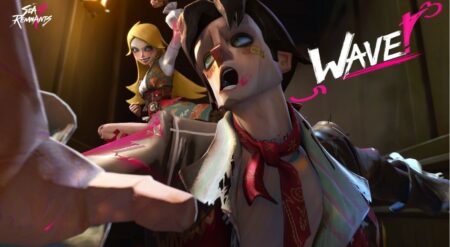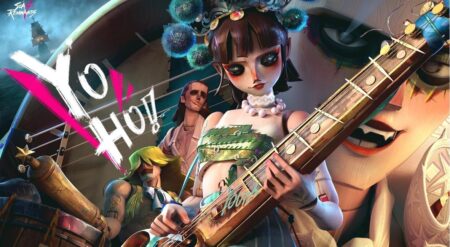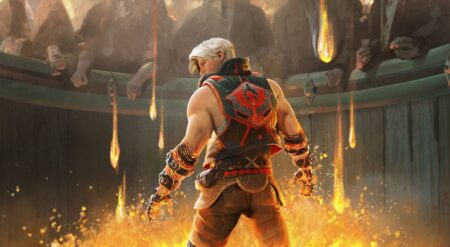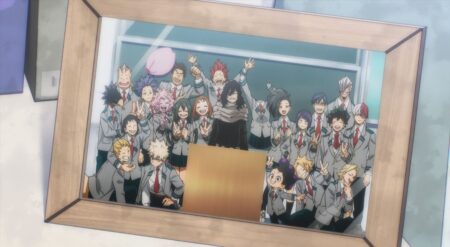
Bringing queer love to the screen remains a tall task, even in 2023. The film industry is disproportionately dominated by men and people who are heterosexual, who, on the whole, fear that queer love stories won’t appeal to mass audiences. It’s how you wind up with movies like Bros that are marketed misleadingly as the first major gay romcom (Fire Island was literally right there) and with a story so watered down into basic poppers jokes and lesbian stereotypes that its target audience was ultimately just anybody except the gay men who made it. And frankly, not every queer actor or creator wants to be constantly pigeonholed into roles playing queer love interests or acting in queer romances. For as much as I adored Your Place or Mine, I can’t stop thinking about Tig Notaro’s pointless and lifeless performance as the butch best friend that screams, “I’m here for the paycheck, but I’m never doing this again.”
And then, when good queer romances even do come to theaters in the U.S., they’re small releases like Of an Age since most of them aren’t backed by mega-stars or mega-money like Bros was or Booksmart. As the season of love comes to a close this year, I sat down with Dutch actor and creator Hanna van Vliet, whose stories of often queer love and romance I’ve enjoyed immensely, including her original series and Netflix movie Anne+ and an episode of the excellent Modern Love: Amsterdam.
Before anything else, Hanna set me straight about how she perceives her work as it relates to love and romance. Where I began the interview with the assumption that all of her works that I’ve seen, including Quicksand and the forthcoming The Lost Transport, revolved around romance given her characters’ marital status in both movies, she was quick to question this assumption. “[Romance] is a big part of life. But I do think it’s interesting that you feel like that,” she exposed me. “Do you feel like films like Quicksand and Lost Transport are about love and romance?”
I was stunned, frankly, because she was right. I was projecting my fixation on love and romance onto her body of work in a way that was inauthentic to her role in its creation and her perspective altogether. My now less-than-certain response was that she was right, romance isn’t exactly the driving factor in all of these films. Frankly, it’s not even the driving factor in her episode of Modern Love, the more I think about it, even if it’s a big part of the relationship there—pregnancy is more honestly at its core, among other themes.
Hanna continued, “I try to find projects that are not necessarily about love or straight love, but, it’s a big part of life and a lot of characters have love interests. I think the fact that it’s relatable for a lot of people and for me as an actor. That’s always a good starting point when you feel something is relatable. We’ve all known, maybe not all, but most of us have known, the feeling of being in love, or rejected, or heartbroken, or longing for something or someone.
Modern Love is called “Modern Love,” though, not “Modern Romance,” because it’s a show that exhibits so many different forms of love besides just the amorous kind. I asked what the difference was between love and romance, and Hanna explained, “Love is something you can feel for anyone. I feel a lot of love for my parents, but I’m not in love with them. So romance to me feels like romance, like Valentine’s Day, like a romantic love interest.”
Distinguishing between these kinds of love and still longing to understand what made love a valuable tool in storytelling, Hanna shared that, like love itself, depicting love well is about nuance and specificity. “I think a lot of the time, the stories we see on-screen are simplified in a way,” she lamented. “To me, it gets interesting if we see the behavior of people… and not [just] cliche outcomes, or the expected emotions at the expected times. Because, as a person, sometimes you do weird stuff at weird moments!” What mainstream media often misses, Hanna believes, is that what’s most important in depicting romance is what’s unspoken between the characters. “When you’ve been together for a long time with a person, you develop some weird habits—voices or nicknames.”
But even in explaining how as an actor or writer, she tries to stay keenly aware of a character’s behavioral intricacies, she can’t help but feel like even that sounds like a big cliche. Which, perhaps, is because, as our staff at But Why Tho? often attest to, the more specific a performance or a character gets, the more relatable they become. So any time you portray characters like real humans with real idiosyncracies, you might begin to feel they’re acting out cliches, not because you’ve seen this specific performance or specific moment before but because it so keenly reminds you of your own experience that you can’t help but see yourself in it over and over, like a cliche.

Hanna performed in her episode of Modern Love: Amsterdam with her real-life partner, Ilke Paddenburg, which made avoiding what could have felt like cliches even more challenging but also all the more fulfilling of a performance. It was interesting for them to sort out the differences between their real longstanding relationship and the characters they were playing. “The characters were slightly different [than us]. It’s very easy to slip into some sort of a comfort zone, but they’re characters. We improvised a lot… and it’s very hard not to rely on your own habits, so we did take our dynamics into the scene and made it their dynamics. It’s like we had 8 years of rehearsal, [but] as I said, it’s also tricky sometimes too, to not let our dynamics [completely] take over their dynamics.”
One trope that will perhaps always bother me in storytelling is when a plot or its drama revolves entirely around characters’ unwillingness to communicate something with one another that they have no good excuse not to. It’s not because poor communication is unrealistic. It’s probably one of our society’s greatest failures. It’s because I believe that at their core, stories have a right to be aspirational, and therefore it’s okay for characters to have good communication sometimes, even when most of us don’t in real life. The trope doesn’t bother me because of its individual employment. It’s the fact that we see it again, and again, and again, as if that’s the way society ought to be, or at least the only way creators can imagine society ever being.
For Hanna, the historical portrayal of female characters as lacking other interests or talents besides men is her grand storytelling frustration. She’s still shocked, even understanding the ins and outs of the film industry as she does, by just how few movies pass the Bechdal Test even today, let alone some of her favorites from when she was younger like Love Actually. “When we wanted to make Anne+, we just wanted to make a short-form series about love and people dating. But people were not ready for there being no men in the show. People were like, ‘she’s a lesbian, so that’s niche, we can’t give you money because there’s no one that would watch.’ [Anne+] is not a lesbian show, it’s about love.”
Exposure to queer love stories is essential, whether it’s normalizing queerness in mainstream society, celebrating queerness in explicitly queer spaces, or helping people who don’t yet understand their queerness have examples to possibilities to draw from. I would certainly not understand my own queerness were it not for exposure to queer media, and for Hanna and countless others, it’s the sheer lack of positive, fun, joyful queer love stories in our youths that helped make coming out, seeing ourselves, or even just understanding queerness so difficult. But for Hanna, depicting queer love shouldn’t have to be a big deal.
With full acknowledgment for the film’s behind-the-scenes woes, “For me, the first [queer] film I really remember is Blue’s the Warmest Color. [It’s] a story about love and heartbreak and all the complexities [of romance] that’s not about them being two women.” It’s a story, to Hanna, where the characters just so happen to both be women. “I related to it very much because, for the very first time, I didn’t have to make the effort to see myself in a male character or in a straight female character. I could just watch the movie and relate to it.”
The film industry still has a long way to go in how it brings queer love stories to our screens. But when actors and creators like Hanna van Vliet bring their queerness to the screen, whether in love stories or historical dramas, portraying straight-presenting relationships or complicated queer ones, they are nonetheless bringing their queerness to every line and every block. As Hanna put it astutely, “I’ve been watching straight films my whole life, and I relate to them on a certain level.”
Can’t straight people relate to queer love stories too?

